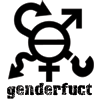I've heard/read a lot of gay people argue about being "normal"--about being "just like everyone else" (read: just like straight people). A person called Vince wrote on the Queers United forum, "I dont know what the freaking problem is. Thanks God more people see us as normal. If you only consider youself to be gay not to be mainstream... poor you." This statement seems like a pretty good representation of that sort of sentiment.
To me, this sort of thinking--“Thank God more people see us as normal”--is exactly the sort of thinking that excludes those queers who are most marginalized. That’s the sort of thinking that wants drag queens to not “embarrass” them at Pride. That’s the sort of thinking of those who would disown queers simply for being themselves because who they are isn’t mainstream enough, safe enough, bland enough to blend in. “Those sorts of people” scare the straight people. It’s the idea that being queer is fine, as long as you look and act “straight.” And while we’re at it, let’s remember that often, the idea of what seems “straight” and what seems “gay” is deeply intertwined with gender norms. People who abide by typical gender norms--people who appear to be “gender-normal”--usually are assumed to be straight. People who somehow transgress gender norms are typically assumed to be gay. Homophobia often masks transphobia.
This emphasis on being seen as “normal” goes along with the idea that queer people must hide themselves in order to fit in, often even among people who are nominally tolerant of gay people. Being upset about Prop 8 or Question 1 or DADT or the lack of federal antidiscrimination laws that would protect the LGBT community is sometimes seen as being militantly gay and promoting the gay agenda. Being angry that being queer is seen as a grave threat to morality by many religious people is seen as being intolerant of people’s faith. Wanting the same legal rights, privileges, and protections as anyone else is seen as attempting to push our views on everyone else. Being openly queer--being out and proud and unwilling to simply keep our heads down and accept the status quo--is seen as practically inviting intolerance and bigotry.
In a Newsweek article called “King of Queens,” Ramin Setoodeh questions whether flamboyant gay male characters on TV shows may be hurting the gay cause by pushing the boundaries of what is considered socially acceptable too much. Setoodeh writes, “But if you want to be invited to someone else's party, sometimes you have to dress the part.” The problem with this line of thinking is that this is not “someone else’s party.” This is our society, our country, too. I am a citizen of the United States of America. This is my party. And I refuse to accept the idea that I should subdue who I am, change how I present myself, “normalize” myself, in order to have the rights and protections that I deserve as a citizen of this country. I should not be treating like a second-class citizen in my own country.
In a May 28, 2008, article titled “Why One Queer Person Is Not Celebrating California's Historic Gay Marriage Decision,” Mattilda Berstein Sycamore writes, “the gay marriage movement is busy fighting for a 1950s model of white-picket fence 'we're just like you' normalcy. And that's no reason to celebrate.”
Part of the reason why I dislike the “we’re just like you” mentality is that queers are not just like straight people. I’m not saying that there’s some sort of intrinsic difference between queer and straight people, other than the obvious difference in sexual orientation, which is the reason for the homosexual/heterosexual categories in the first place--by definition, they have at least that one difference. However, our society is a heterosexist, often homophobic, society, and that is the big difference that I am focusing on between queers and straights. Other than having some form of same-sex/same-gender/non-conventional-heterosexual desire or attraction, gay, lesbian, bisexual, and other queer people don’t have anything inherently in common, just because of not being heterosexual in the traditional sense.
Nevertheless, all queers have to deal with not being heterosexual in a heterosexist society. Dealing with harassment and discrimination, lack of representation in the media, lack of the legal rights and protections that straight people have, constant messages that being straight is right or normal--dealing with all of this is an experience that, though it varies for everyone, all queers experience to some extent. And that is a distinct difference that makes queers different from straight people, and saying “we’re just like you” ignores this experience.
To me, being seen as "normal" is often the same as being invisible, as being seen as straight. I'm not saying that we, as queers, don't deserve the same rights, dignity, respect that non-queer people have. I'm not saying that all gay people, or all people under the LGBT umbrella, must be angry, activist, rebellious queers.
But I'll fight for my right to be a freak, to be a queer, to be other. It’s not that I want to be “other” just for the sake of being different; it’s that I don’t want to blend in when the crowd doesn’t adequately represent who I am. And I don't want to be normal until “normal” encompasses all aspects of who I am. When “normal” somehow embraces me being myself, and not being “just like everyone else,” then--and only then--will I consider “normal” to be good enough. Until then, to hell with normalcy.
Tuesday, December 15, 2009
Subscribe to:
Post Comments (Atom)

No comments:
Post a Comment